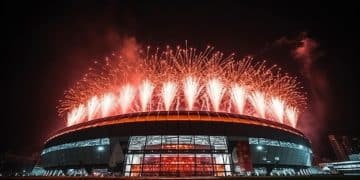US Soccer Fan Travel Guide: Maximize Your World Cup 2026 Experience

Planning to attend the World Cup 2026 in North America? This comprehensive guide offers essential tips for US soccer fans, covering everything from ticket acquisition and accommodation to transportation, local experiences, and maximizing your overall tournament journey and immersion.
As the FIFA World Cup 2026 approaches, the excitement for US soccer fans reaches a fever pitch. This unprecedented event, hosted across the United States, Canada, and Mexico, offers a unique opportunity to witness the pinnacle of international football right on home soil. To truly maximize your World Cup 2026 experience, meticulous planning is paramount, transforming a mere attendance into an unforgettable journey.
Navigating the Ticketing Labyrinth: Your Gateway to the Games
To kick off your World Cup 2026 journey, understanding the ticketing process is crucial. The sheer demand for World Cup tickets often outstrips supply, making early and strategic planning essential. FIFA typically implements a multi-phase sales approach, beginning with random draws and followed by first-come, first-served sales. Fans should register for a FIFA ticketing account well in advance and subscribe to official newsletters to receive timely updates.
Initial phases might involve lottery systems, where fans express interest in specific matches or team packages. Success in these lotteries is not guaranteed, highlighting the need for patience and persistence. Subsequent phases usually open up to general sales, often leading to virtual queues and quick sell-outs. Being prepared with payment details and a strong internet connection can make all the difference. Remember, only purchase tickets from official FIFA channels to avoid scalping and fraudulent tickets. Third-party sites often overcharge or sell invalid tickets, leading to significant disappointment.
Official Channels and Packages
Opting for official channels is not just about security; it’s about the assurance of a legitimate experience. FIFA’s official hospitality packages, while more expensive, often guarantee match tickets along with premium services like catering, entertainment, and exclusive access. These packages can range from single-match experiences to comprehensive tournament-long itineraries. For those seeking a more luxurious or hassle-free trip, these packages might be a worthwhile investment, bundling travel, accommodation, and match access.
It is also wise to consider the different types of tickets. Individual match tickets allow for flexibility in your schedule, while team-specific series tickets offer access to all group stage matches of a particular national team. Venue-specific series tickets grant access to all matches at a chosen stadium. Each option caters to different preferences and budgets. Researching host cities and their match schedules will help narrow down your choices and increase your chances of securing tickets for your desired games.
Secondary Market Caution and Resale Platforms
While the allure of the secondary market can be strong, especially as the tournament approaches, extreme caution is advised. Unofficial resale platforms are rife with inflated prices and fake tickets. FIFA often operates its own official resale platform closer to the event, providing a secure and regulated environment for fans to buy and sell tickets at face value or through a transparent process. This official platform is the only legitimate alternative if you miss out on initial sales. Trusting only verified sources ensures a smooth and legitimate entry into the stadiums.
Ultimately, securing your World Cup 2026 tickets is the first major hurdle. By staying informed, registering early, and utilizing only official channels, you significantly increase your chances of being part of this historic event. The memories created watching your favorite team compete are priceless, making the effort in ticket acquisition unequivocally worthwhile.
Strategic Accommodation: Where to Stay and Why
Once your tickets are secured, lodging becomes the next critical component of your World Cup 2026 travel plan. With millions of fans descending upon host cities, demand for accommodation will skyrocket, leading to increased prices and limited availability. Early booking is not just a recommendation; it’s a necessity. Consider booking as soon as match schedules and host city assignments are confirmed, or even before, if you have a strong preference for a particular city.
Choosing Your Base: Hotels, Rentals, and Beyond
Host cities across the US, Canada, and Mexico offer a spectrum of accommodation options, each with its own advantages and disadvantages. Hotels provide convenience, amenities, and often central locations, but come with a higher price tag during major events. Airbnb and other short-term rental platforms offer more space, potentially lower costs for groups, and a more localized experience, but might require booking well in advance. Hostels are a budget-friendly option, particularly for solo travelers, fostering a communal atmosphere.
When choosing your base, consider proximity to stadiums, public transportation hubs, and fan zones. Staying within walking distance or a short public transit ride can save significant time and money on taxis or ride-shares, which will likely experience surge pricing during peak periods. Research the public transportation networks of your chosen host cities to understand their reach and efficiency.
Beyond the Main Hubs
For those on a tighter budget or seeking a quieter experience, consider staying in towns or suburbs adjacent to the main host cities. These areas often offer more affordable lodging and can still be easily accessible via commuter trains or regional bus services. For example, if attending matches in New York/New Jersey, staying in nearby towns in New Jersey or specific Long Island suburbs could provide a cost-effective alternative while still allowing for easy access to MetLife Stadium. This strategy requires a bit more research into transit routes but can yield significant savings.
* Hotels: Convenience, premium amenities, central locations. Book early for best rates and availability.
* Short-term Rentals (Airbnb, etc.): More space, group-friendly, local immersion. Verify host reputation and cancellation policies.
* Hostels: Budget-conscious, social atmosphere, ideal for solo travelers. Research location relative to transit.
Also, be aware of dynamic pricing. Prices for hotels and rentals will fluctuate based on demand. Many booking platforms offer free cancellation up to a certain point, allowing you to book early to lock in a rate while maintaining flexibility to adjust your plans if better options or definitive match schedules emerge. Always double-check cancellation policies before confirming any reservation to avoid unexpected fees.
Mastering Transportation: Getting Around Your Host City
Efficient transportation is key to a stress-free World Cup 2026 experience. Host cities are preparing for an unprecedented influx of visitors, and their public transportation networks will be crucial. Relying solely on private cars or ride-sharing apps can lead to frustrating delays, especially near stadium precincts on match days. Familiarizing yourself with local transit options well in advance will be a game-changer.
Public Transit: Your Best Friend
Most major US, Canadian, and Mexican host cities boast robust public transit systems, including subways, buses, light rail, and commuter trains. These will be your most reliable and cost-effective means of getting to and from stadiums, fan zones, and tourist attractions. Purchase a multi-day pass or a reloadable transit card upon arrival to streamline your travel. Many cities now offer contactless payment options directly on buses or turnstiles, so check if your credit or debit card is compatible.
* Subways/Metros: Fast, efficient for long distances, bypasses traffic. Ideal for traversing large cities.
* Buses: Extensive routes, good for shorter distances and exploring neighborhoods. Be mindful of traffic.
* Light Rail/Streetcars: Often connect downtown areas with specific attractions or stadium districts.
* Commuter Trains: Crucial for reaching stadiums located outside city centers or for traveling between adjacent host towns.
It is advisable to download city-specific transit apps, which often provide real-time tracking, route planning, and fare information. These apps can be lifesavers when navigating an unfamiliar city. Planning your routes the night before match days can also help avoid last-minute panic and ensure you arrive with plenty of time to spare for security checks and pre-game festivities.
Alternative Transportation and Stadium Access
While public transit is recommended, other options exist. Cycling can be a pleasant way to explore some cities, especially if dedicated bike lanes are available. Bike-sharing programs are common in urban centers. For longer distances or specific itineraries, taxis and ride-sharing services (Uber, Lyft) offer convenience, but expect surge pricing and potential difficulty in securing a ride during peak hours or immediately after matches. Consider booking ride-shares in advance if possible or walking a few blocks away from the immediate stadium area to find a less congested pick-up spot.
For fans with rental cars, be aware that parking at or near stadiums will be extremely limited and expensive. Many cities implement road closures around venues on match days, making driving difficult. If you plan to drive, explore park-and-ride options well outside the immediate stadium vicinity, utilizing transit to complete your journey. Accessibility for fans with disabilities will also be a priority, with dedicated drop-off points and accessible transit options; research these specifics for each host venue.
Unlocking Local Experiences: Beyond the Match
The World Cup 2026 is more than just a series of football matches; it’s an opportunity to immerse yourself in the vibrant cultures of the host cities. Each city—from Vancouver to Guadalajara, Seattle to Atlanta—offers unique attractions, culinary delights, and a distinct atmosphere. Integrating local experiences into your itinerary will undoubtedly enrich your overall travel adventure.
Embracing Host City Traditions and Attractions
Before your trip, research the iconic landmarks, museums, and natural wonders of your chosen host cities. Whether it’s exploring the historic streets of Old Montreal, visiting the Space Needle in Seattle, or experiencing the jazz scene in New Orleans, each city provides a different flavor. Engaging with local history and culture provides a welcome break from the football frenzy and allows for a deeper appreciation of your surroundings.
* Museums and Art Galleries: Discover local history, art, and cultural heritage. Many offer free admission on specific days.
* Parks and Green Spaces: Provide an opportunity to relax, enjoy nature, and escape the urban bustle.
* Local Markets: Sample regional delicacies, purchase unique souvenirs, and interact with local vendors.
Consider guided walking tours or bus tours to gain insider perspectives on the city’s highlights. Many cities also have official tourism apps that provide maps, event listings, and curated itineraries, making it easier to plan your non-match days. Don’t be afraid to venture beyond the typical tourist traps and discover hidden gems, perhaps a recommendation from a local you meet.
Culinary Adventures and Fan Festivities
No travel experience is complete without sampling the local cuisine. From authentic Mexican street food in Guadalajara and American BBQ in Kansas City to fresh seafood in Vancouver and New York-style pizza, the culinary landscape of North America is incredibly diverse. Seek out local eateries rather than relying solely on international chains. Ask locals for their favorite spots or explore popular food markets for an authentic taste of the region.
Beyond the formal attractions, the World Cup inevitably brings vibrant fan festivities. Host cities will set up official Fan Fests, typically large public viewing areas with big screens, live entertainment, food and beverage vendors, and interactive activities. These Fan Fests are fantastic places to soak in the atmosphere, meet fans from around the world, and watch matches even if you don’t have a ticket for the stadium game. They are often family-friendly and provide a safe and exciting environment for all ages.
Embrace the spontaneity of travel. Some of the best experiences come from unexpected encounters or detours. Be open to meeting new people, sharing stories, and embracing the global camaraderie that only the World Cup can foster. Your travel experience goes far beyond the 90 minutes on the pitch.
Connectivity and Communication: Staying in Touch
In an age of constant connection, ensuring reliable communication and internet access is fundamental for any international travel, especially during a major event like the World Cup 2026. Staying connected allows you to navigate, share your experiences, and remain updated on important tournament information.
SIM Cards and eSIMs: Your Gateway to Local Data
For most international travelers, purchasing a local SIM card or utilizing an eSIM is the most economical and convenient way to access mobile data and make local calls. Major telcos in the US, Canada, and Mexico offer various prepaid plans tailored for tourists, usually available at airports, convenience stores, or official brand stores. SIM cards are inserted into your physical phone, while eSIMs are digital and can be activated remotely, ideal if your phone supports this technology.
* Prepaid SIM Cards: Physical cards available for purchase, offering data, calls, and texts. Typically require an unlocked phone.
* eSIMs: Digital SIM profiles, activated via QR code or app. Great for dual SIM capability or if you don’t want to swap physical cards.
* International Roaming: Often expensive; check with your home provider for specific World Cup roaming packages, but usually not the most cost-effective.
Research plans before you arrive to understand data allowances, validity periods, and network coverage in your specific host cities. Having reliable mobile data is crucial for using navigation apps, ride-sharing services, staying in touch with travel companions, and accessing online ticketing information. Many stadiums and public venues also offer free Wi-Fi, but these networks can be unreliable or overloaded during peak times, making a personal data plan essential.
Essential Apps and Emergency Preparedness
Beyond general connectivity, specific apps will enhance your World Cup experience. Download and familiarize yourself with navigation apps (Google Maps, Apple Maps), ride-sharing apps (Uber, Lyft), and local public transportation apps. Translation apps can also be invaluable if you’re traveling to regions where English is not the primary language, especially in Mexico.
Moreover, have a plan for emergencies. Store important contact numbers—emergency services, embassy/consulate information, and travel insurance details—both digitally and as a physical copy. Share your itinerary with a trusted person back home. Familiarize yourself with local emergency numbers (e.g., 911 in the US and Canada). While World Cup events are generally safe, being prepared for unexpected situations provides peace of mind.
Staying connected helps you optimize your travel logistics, share the excitement of the tournament with friends and family, and ensures you’re always informed. Investing a little time into setting up your communication strategy before you leave will pay dividends throughout your trip.
Budgeting and Financial Planning for the World Cup
Attending the World Cup 2026 will undoubtedly be a significant financial undertaking. From tickets and flights to accommodation, food, and local transport, costs can quickly accumulate. A detailed and realistic budget is not just recommended; it’s a critical component of a stress-free travel experience.
Estimating Costs: A Detailed Breakdown
Begin by researching average costs for each major category. For flights, use flight aggregators and set price alerts. For accommodation, start monitoring hotel and rental prices in your target cities now. Factor in daily expenses for food and beverages, remembering that stadium prices will be higher. Public transport passes, souvenir shopping, and any planned excursions also need to be accounted for.
* Flights: Often the most variable cost. Book well in advance for the best rates. Consider flying into smaller regional airports if they are adequately connected to host cities.
* Accommodation: As discussed, prices surge during major events. Early booking or considering alternative areas can save costs.
* Tickets: Official FIFA tickets have set price tiers; hospitality packages are significantly more. Avoid unofficial resale markets due to inflated prices.
* Food & Drinks: Allocate a daily budget. Eating out can be expensive, so consider balancing restaurant meals with grocery store purchases or street food.
* Local Transportation: Public transit passes are generally the most affordable option. Factor in ride-sharing or taxi costs if needed.
* Contingency Fund: Always build in a buffer of 10-15% of your total budget for unexpected expenses or opportunities.
Consider using budgeting apps or spreadsheets to track your spending in real-time while on your trip. This helps you stay within your limits and make informed decisions about discretionary spending. Be mindful of currency exchange rates if you’re traveling from outside the US or between Canada and Mexico.
Smart Spending Strategies and Money Security
When it comes to managing your money during the World Cup, common sense and a few smart strategies can go a long way. Use credit cards with no foreign transaction fees where possible, as they often offer better exchange rates than cash exchanges. Inform your bank and credit card companies of your travel plans to prevent transaction flags or card freezes. While credit cards are widely accepted, it’s wise to carry some local currency for small purchases, street vendors, or in case of card reader issues.
Be vigilant about the security of your money and belongings. Use hotel safes for valuables, avoid flashing large sums of cash, and be aware of your surroundings, especially in crowded areas like fan zones or stadiums. Consider travel insurance, which can cover medical emergencies, trip cancellations, lost luggage, and other unforeseen events, providing an invaluable layer of financial protection. This is an expense worth considering for peace of mind.
A well-planned budget ensures that financial concerns don’t detract from your enjoyment of the World Cup. It empowers you to make informed choices and fully immerse yourself in the excitement of the tournament without unnecessary stress.
Health and Safety: Prioritizing Your Well-being
While the World Cup promises an exhilarating experience, prioritizing your health and safety is paramount to ensuring a memorable trip. Being prepared for potential health issues and understanding local safety guidelines can prevent minor inconveniences from becoming major problems.
Health Preparedness and Travel Insurance
Before you embark on your journey, consult your doctor regarding any necessary vaccinations or health precautions for the regions you plan to visit. Ensure your routine vaccinations are up-to-date. If you take prescription medications, bring an adequate supply, along with a copy of your prescription and a doctor’s note, especially if they are controlled substances. Keep medications in their original containers and in your carry-on luggage.
* Travel Insurance: Highly recommended. Covers medical emergencies, trip cancellations, lost luggage, and other unforeseen events. Read policies carefully to understand coverage limits and exclusions.
* First-Aid Kit: Carry a basic kit with pain relievers, band-aids, antiseptic wipes, and any personal medications.
* Local Medical Facilities: Research the location of hospitals and pharmacies in your host cities.
Stay hydrated, especially during long days of cheering, and be mindful of sun exposure, particularly if attending outdoor events. Be aware of any local health advisories, such as those related to air quality or specific infectious diseases, and take appropriate precautions. Familiarize yourself with how to access emergency medical services in your host cities.
Personal Safety and Awareness
While host cities will implement enhanced security measures for the World Cup, maintaining personal vigilance is crucial. Be aware of your surroundings, especially in crowded areas like stadiums, fan zones, and public transportation hubs. Pickpocketing and petty theft can occur in congested tourist spots. Keep valuables secure and out of sight. Avoid carrying excessive amounts of cash or important documents like passports unless absolutely necessary; consider using a money belt or secure internal pockets.
Do not accept drinks or food from strangers, and be cautious about over-indulging in alcohol, which can impair your judgment and make you vulnerable. If you are traveling in a group, establish a meeting point in case you get separated. Trust your instincts; if a situation feels unsafe, remove yourself from it. Familiarize yourself with emergency contact numbers for the local police and emergency services in each host city.
Understanding Local Laws and Customs
Briefly research local laws and customs of the US, Canadian, and Mexican host cities. While all three are generally welcoming, understanding nuances can prevent misunderstandings. For instance, laws regarding public alcohol consumption, smoking, or even photography can vary. Each country has its own legal system and cultural norms. Being respectful and informed contributes to a smoother and more enjoyable journey.
By prioritizing your health and safety through diligent preparation and awareness, you can fully immerse yourself in the World Cup experience with peace of mind, knowing you’ve taken steps to protect your well-being.
Final Preparations and Mindset for an Unforgettable Trip
As the FIFA World Cup 2026 draws closer, the final touches on your travel preparations can make all the difference between a good trip and an unforgettable one. Beyond the logistics, cultivating the right mindset is key to embracing the unpredictable and thrilling nature of a global sporting event.
Packing Smart and Essential Documents
Packing efficiently is crucial, especially if you plan to travel between multiple host cities. Consider the varied climates across North America. For example, East Coast cities in summer can be hot and humid, while Vancouver might be milder. Pack layers, comfortable walking shoes, and any team merchandise you wish to wear. A small, hands-free daypack is ideal for carrying essentials to matches and touring. Remember to check stadium bag policies well in advance; many restrict bag size.
Ensure all your essential documents are in order and easily accessible. This includes your passport (ensure it’s valid for at least six months beyond your intended departure date), visas if required (check entry requirements for US, Canada, and Mexico based on your nationality), flight and accommodation confirmations, and any digital tickets. It’s wise to have both digital and physical copies of critical documents, stored securely and separately. Consider creating a digital folder on your phone or cloud service for quick access.
Embracing the Unexpected and Flexibility
Despite all the meticulous planning, travel during a major international event invariably involves unexpected situations. There might be transit delays, crowded venues, or even weather changes. Cultivating a flexible mindset is vital. Approach challenges with patience and a problem-solving attitude rather than frustration. Understand that millions of people will be converging, and some friction is inevitable.
Embrace the vibrant, diverse atmosphere. The World Cup is a celebration of global cultures uniting through the love of football. Be open to meeting fans from every corner of the globe, sharing stories, and making new friends. Learn a few basic phrases in the local language of your Mexican or Canadian host cities; a simple “hello” or “thank you” can go a long way. This spirit of openness and camaraderie is what makes the World Cup truly special.
* Be Flexible: Plans might change; adapt and find alternative solutions.
* Stay Positive: Challenges are part of the adventure; maintain a good attitude.
* Engage with Others: Interact with fellow fans and locals; build connections.
Staying Informed and Enjoying the Journey
Leading up to and during the tournament, stay informed through official FIFA channels, host city tourism boards, and reputable news sources. Updates on match schedules, fan zone activities, and transportation alerts will be disseminated regularly. Signing up for text message alerts from official sources can provide real-time information that might impact your plans.
Ultimately, the World Cup 2026 is a once-in-a-lifetime opportunity for many US soccer fans. By addressing the logistical challenges with forethought and approaching the experience with an open, enthusiastic mindset, you are set to create memories that will last a lifetime. Prepare diligently, but also remember to let loose and revel in the beautiful game. This is not just a tournament; it’s a global festival of football, and you’re invited to be part of history. From the roar of the crowd to the cultural immersion, your journey to maximize your World Cup 2026 experience begins with these strategic steps.
| Key Aspect | Brief Description |
|---|---|
| 🎟️ Ticketing | Buy only from official FIFA channels for genuine tickets. Register early for lottery phases. |
| 🏨 Accommodation | Book very early. Consider hotels, rentals, or adjacent towns for varied options. |
| 🚇 Transportation | Prioritize public transit; avoid driving near stadiums. Use city-specific transit apps. |
| ⚕️ Health & Safety | Secure travel insurance and pack a basic first-aid kit. Stay aware of your surroundings. |

Frequently Asked Questions About World Cup 2026 Travel
▼
You should start planning now, especially for major aspects like tickets and accommodation. Official FIFA ticket sales typically begin well in advance, often over a year before the tournament. Booking flights and accommodation early ensures better availability and potentially lower prices, avoiding last-minute surge pricing due to high demand.
▼
The best and safest way to secure tickets is exclusively through official FIFA ticketing channels. Register for an account on the FIFA website and subscribe to their official newsletters for updates on sales phases, including lottery draws and first-come, first-served opportunities. Avoid unofficial third-party resellers to prevent fraud and inflated prices.
▼
To maximize your budget, consider staying in areas adjacent to host cities for cheaper accommodation, utilize public transportation extensively, and balance restaurant meals with groceries or more affordable local eateries. Booking flights and accommodation well in advance also helps secure better rates. Always set a contingency fund for unexpected expenses.
▼
Essential packing includes comfortable walking shoes, layers of clothing for varied weather, and any team merchandise. Don’t forget your passport, necessary visas, and physical/digital copies of all important documents and tickets. A portable charger for your phone and a basic first-aid kit are also highly recommended for convenience and safety.
▼
Travel insurance is highly important for the World Cup 2026. It provides crucial coverage for unforeseen circumstances such as medical emergencies, trip cancellations, lost luggage, or travel delays. Given the scale and cost of an international event like the World Cup, comprehensive insurance offers significant peace of mind and financial protection.

Conclusion
The FIFA World Cup 2026 represents a monumental opportunity for US soccer fans to be part of football history on home soil. A truly exceptional experience hinges not just on the 90 minutes of play, but on the meticulous planning and thoughtful engagement with every aspect of the journey. From diligently securing official tickets and strategically booking accommodations to mastering local transportation and fully immersing oneself in the unique cultural tapestry of each host city, every detail contributes to the overall adventure. Prioritizing health, safety, and financial foresight further ensures that the focus remains on the electrifying atmosphere and shared passion for the beautiful game. By embracing these strategic pillars and adopting a flexible, open mindset, fans are poised to transform their World Cup attendance into an unforgettable, once-in-a-lifetime memory.





